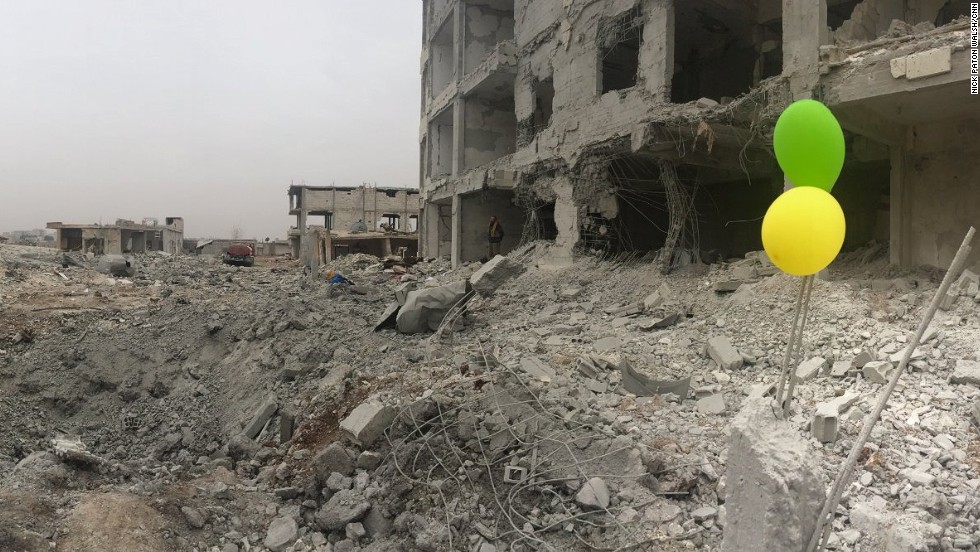Its
streets have been so ground down to the bone, that the prize -- so
small but so intensely fought over -- is now unrecognizable.
Every time you open your eyes in Kobani, you see the damage.
There are people still there, but it is
hard to gauge how many. Food is scarce, as is fuel for heat. And day and
night, indiscriminate, homemade mortars rain down on Kurdish homes --
ISIS borrowing a technique, it seems, from the Syrian regime, and using
domestic gas canisters and junk metal to kill or maim civilians.

You can hear the clank of these metal shards bouncing on the street outside as you try to sleep.
Airstrikes
by the U.S.-led coalition against ISIS -- often three thuds in rapid
succession -- shake the very ground you are lying on. They have held
ISIS back, but not enough for the Kurds.
From
what we saw, the front lines appear much more toward the city's center
than some Kurdish advocates would suggest. To the city's west, too, ISIS
fighters are nearer than sometimes advertised. This is a fight that is
still in the balance.
To the city's
east is the most hotly contested front line. We are led there by Meedya
Raqqa, the pseudonym of a 22-year-old Kurdish female fighter.
In
a testament to the egalitarian way the Kurds live, she is this unit's
commander. She has been fighting ISIS for two years -- almost since the
Sunni extremist group's beginning.
ISIS fighters have been as close as five yards away from her. She has lost friends here, but also made them.
"I
lost a lot of friends in this war and I resist to avenge their death,"
she tells me. "No matter the destruction in Kobani, it can be built
again -- the important thing is to destroy this strange enemy that
entered our land."
The hardest loss to
bear is that of her closest friend Reeban early this year. The Kurds
have been fighting a lot longer than coalition airstrikes have been
falling.
"I lost my best friend eight months ago. She killed herself to save her friends and the injured around her," Raqqa said.
"These
are the difficult moments that we live, but I told you we gain strength
from these martyrs. They are difficult moments that make you do more to
avenge their death to make her dreams come true. The road she began,
you finish."
The death itself was
heroic and chilling. Reeban was surrounded but also injured. Her fellow
fighters were too. They had used all their ammunition.
"Reeban
pulled back the injured. She advanced while injured and then ISIS
surrounded her. Girls are very prized by ISIS. She blew herself up. She
killed a lot of them with her. Her last words to me were: 'We will
liberate our land with the last drop of blood in my body.'"
Amid all the machismo war usually
generates, it is jarring to see the defense of this city performed by
women in their early 20s. They are very emotionally in touch with each
other, often hugging -- the polar opposite of ISIS' worldview.
"Kurdish
women's resistance will show the world a new history of women in which
(women) can break all the rules that have no real basis in customs or
traditions," said Raqqa.
But first, the fight for Kobani.
She leads us through a series of holes made in the walls of buildings rendered skeletal by the fighting in the east.
One
official called the city "Kobanigrad," after the city whose people and
essence the Soviet Union's Joseph Stalin sacrificed to make a point.
It is hard to know what will be left to
celebrate once the fighting ends, but up on the gun position she takes
us to, the intensity of the battle remains clear.
Heavy
machine guns try to hit ISIS in the rubble. ISIS fighters lie dead in
the no-man's land between the two front lines -- distant in their decay
from the glorious death of which ISIS propaganda often talks.
One
navy machine gun jams repeatedly. This is a war the Kurds are still
fighting with aging, scavenged weapons, even though pinpoint munitions
fall from coalition jets onto their common enemy. Their fighters'
repeated plea is for better weaponry.
Across no-man's land, you can hear ISIS call out "Alla-u-akhbar," God is the greatest -- the group's common rallying cry.
The
Kurds, also Muslims, mock it gently. Their two views of civilization
are almost millennia apart, but now separated by a stretch of icy mud,
increasingly smaller than they would like.
Raja Razek contributed to this report.

No comments:
Post a Comment